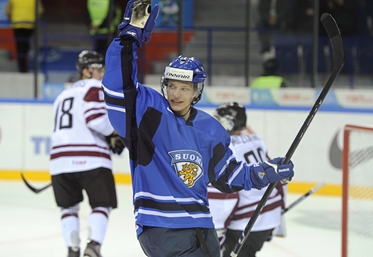When injuries take a toll
When injuries take a toll
Results can hinge on losses like Finland's Aaltonen

 Finland enjoyed a 3-1 lead after the first period in its opening game with Latvia. Photo: Richard Wolowicz / HHOF-IIHF Images
Finland enjoyed a 3-1 lead after the first period in its opening game with Latvia. Photo: Richard Wolowicz / HHOF-IIHF Images
History shows that long-term injuries suffered during a tournament can take a toll on the entire team – not just in terms of the lineup juggling and insertion of replacement talent that’s required, but also in terms of how it affects the psyche of the remaining players.
And while the IIHF’s emphasis on Fair Play and Respect helps to foster a safer environment for players, hockey is a high-speed contact sport and sometimes injuries just happen.
The Finns, who must now slog through the Relegation Round in Ufa, will be remembered as one of those “What if?” teams. From star forwards like Joel Armia, Markus Granlund, and Aleksander Barkov to big blueliners like Rasmus Ristolainen and Olli Maatta, there was so much medal potential.
Head coach Harri Rindell’s team might have gone deeper if Aaltonen hadn’t had a chance collision with Latvia’s Pauls Zvirbulis early in the third period of the opening 5-1 win over Latvia. The gruesome way the 19-year-old Espoo Blues forward’s right ankle twisted underneath him as he went down was not pleasant for anyone to witness – least of all for his young teammates.
Losing 3-1 to the less talented Czechs and eking out a 5-4 overtime win over Switzerland indicated something was wrong. Did Aaltonen’s injury affect the team deeply?
“Unfortunately, yes,” Rindell said after his team fell 7-4 to Sweden in the Group A finale. “We were talking about that with the team. [Aaltonen] was in good shape, he had the experience, he’s always playing for the team., and he’s a good goal-scorer. And he was a centerman. I mean, if you lose one winger, then you’re OK. But when it’s probably your number two or number one centerman, it cost us a lot of energy. Even though we were talking through those things, that it’s hockey. Honestly, I felt very bad, because unconsciously you thought that might cause problems for us, and that was the case.”
To a greater or lesser extent, similar scenarios have played out at other recent World Juniors. Look at perennial gold medal contender Canada, for instance.
Rugged winger Devante Smith-Pelly broke a bone in his left foot while blocking a shot in Canada’s opening 8-1 win over Finland at last year’s tournament in Calgary. "He was...probably the hardest hitter in the tournament,” said Canada’s Dougie Hamilton. “I think a lot of the opposing defencemen are going to be pretty happy with him being out.” When Canada’s comeback in its 6-5 semi-final loss to Russia fell short, it’s possible that the Mississauga St. Michael’s Majors veteran could have brought a physical presence that would have turned the tide in his team’s favour.
At the 2011 World Juniors in Buffalo, forward Jaden Schwartz (the 2012 captain) suffered a fractured ankle in Canada’s second game versus the Czechs. That year, Canada shockingly squandered a 3-0 lead in the final and lost 5-3 to Russia. Could the Colorado College veteran’s leadership abilities have helped to settle down coach Dave Cameron’s squad when Yevgeni Kuznetsov and Vladimir Tarasenko started to take over the game? We’ll never know.
In some other cases, hits – both legal and illegal – have devastated a contending team.
In 2005, Russian fans believed Alexander Ovechkin – Washington’s #1 overall pick in the 2004 NHL draft – could lead their team to World Junior gold in Grand Forks, North Dakota, even when facing a stacked Team Canada in the final in that lockout year. But Sidney Crosby’s clean open-ice check in the first period left Ovechkin with a separated shoulder. (The 19-year-old Russian sniper also took punishment from the likes of Patrice Bergeron, Mike Richards, and Corey Perry.) It was no coincidence that, after Ovechkin bowed out of the game, a disheartened Russia would go on to lose 6-1.
The Swedes also suffered a dramatic 6-1 loss to the Canadians in the 1999 semi-finals in Winnipeg. Trailing in the third period, they lost Gabriel Karlsson on a nasty, concussion-inducing hit by defenceman Brad Ference, who was ejected with a five-minute major and a game misconduct. Then an HV71 prospect, Karlsson had scored five goals in five games in his World Junior debut. But he was done, much like his team. Headlined by Daniel and Henrik Sedin, Tre Kronor had entered the tournament with gold medal hopes. But instead, they’d lose the bronze medal game 5-4 to Slovakia.
However, injuries during a tournament don’t always devastate a team. In fact, sometimes the players rally to overachieve.
At the 2010 IIHF Ice Hockey U20 World Championship in Saskatoon, Switzerland had lost star defencemen Roman Josi (broken finger) and Luca Sbisa (hip flexor) by the time it entered a quarter-final match-up with the overwhelmingly favoured Russians. Yet the Swiss pulled off one of the great upsets in World Junior history. Nino Niederreiter’s electrifying 4-3 overtime winner would help propel his nation all the way to the bronze medal game with Sweden.
“We were fighting for our injured guys,” Niederreiter told IIHF.com after beating Russia. “It was so amazing to win. Speaking about us, some people were talking about Swiss cheese. But now we've showed everybody that we may be from a small country, but we can play hockey.”
Even though Switzerland lost 11-4 to Sweden, its fourth-place finish matched its all-time best result from hosting the 1998 tournament.
As the 2013 World Juniors enters its final stages, let’s hope for a healthy finish for all the teams competing in Ufa.
Back to Overview





















































